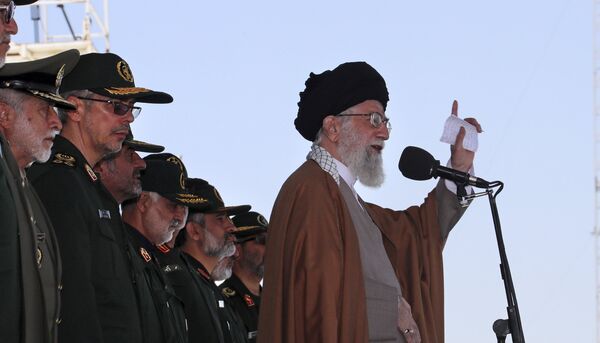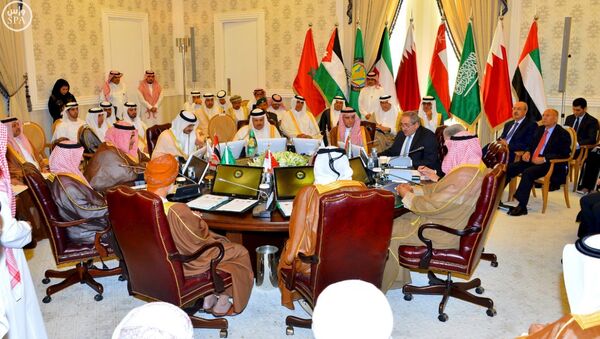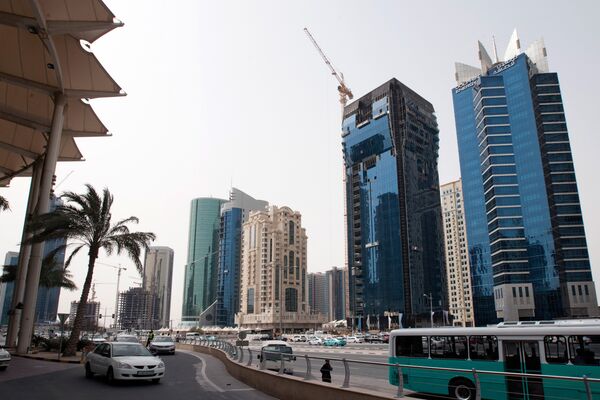In his recent op-ed for RIA Novosti, Mirzayan remarked that the GCC is sometimes referred to as "Arab NATO, EU and UN" rolled into one.
The intergovernmental political and economic bloc was established on May 25 1981. Its member states are the monarchies of Bahrain, Kuwait, Oman, Qatar, Saudi Arabia, and the United Arab Emirates (UAE).
Following the Arab Spring, which demolished the Libyan, Syrian and Egyptian regimes, the GCC has emerged as the most influential Arab bloc in the Middle East and a counterbalance against a resurgent Iran.
According to Mirzayan, Jordan, Morocco and Egypt are regarded as the GCC's "client-states." After the 2013 Egyptian coup d'état Saudi Arabia and the UAE supported Abdel Fattah al-Sisi by billion-dollar investments.
"However, the very existence of this organization is in question now," the academic said.
On June 5, Bahrain, Saudi Arabia, the United Arab Emirates (UAE), and Egypt cut off ties with Qatar accusing it of sponsoring terrorism and collusion with Iran. The countries closed land, air and sea passage to all vessels and vehicles coming from or going to Qatar.
The Saudi-led anti-Qatar coalition handed a 13-point ultimatum to Qatar, demanding, among other things, the severance of ties with Iran and that Doha-based news organization Al Jazeera be shut down. De-facto the Gulf realms wanted Doha to give up its independent foreign policy, Mirzayan noted.
Predictably, Qatar refused to meet the demands outlined in the ultimatum, prompting Saudi Foreign Minister Adel al-Jubeir to announce Wednesday that the anti-Qatar coalition would keep the boycott in place until Doha changes its policies "for the better."
"Now it's up to… the Crown Prince of Saudi Arabia, Mohammed bin Salman, how to punish Qatar for refusing to comply with the demands," Mirzayan remarked, adding that here is the rub.
Indeed, if Riyadh decides to adopt excessively tough measures toward Doha it may split the GCC up.
Citing Leonid Isaev, an expert in Middle Eastern affairs at Moscow's Higher School of Economics, Mirzayan noted that Riyadh's probable offer to exclude Qatar from the GCC would be endorsed by just three members of the organization: Saudi Arabia, UAE and Bahrain. On the other hand, Qatar, Oman and Kuwait are unlikely to approve the move.
Riyadh has another headache in the form of the UAE.
While Saudi Arabia and its local proxies are trying to maintain control over Yemen and keep the state united, Abu-Dhadi is boosting South Yemen seemingly seeking to make it a sovereign entity, Mirzayan noted, adding that "omnipotent" Crown Prince Mohammad bin Salman still can do nothing about it.
At the same time, Abu Dhabi has its own relations with Iran, said the academic, revealing that a considerable part of Iran's grey market imports goes through the UAE.
"Thus, out of all Gulf countries, only one GCC member, Bahrain, shares the interests of the Kingdom of Saudi Arabia (KSA) on the latter's major foreign policy issues, and only because the local dynasty of al-Khalifa strongly depends on the Saudi 'bayonets' [stationed in the country]," the academic stressed.
That means that Mohammad bin Salman's intention to punish Qatar is nothing but pure gambling: if he manages to discipline Doha he will retain Saudi Arabia's power and prestige, if Riyadh fails, the GCC will begin to fall apart at the seams.
Who will benefit from the GCC's collapse?
According to Mirzayan, the main profiteer of the GCC's disintegration is, undoubtedly, Iran.

In case the organization collapses Tehran would jump at the opportunity to engage Qatar, Oman and Kuwait in its political fold. Perhaps, Iran would have even managed to win over Bahrain, the academic remarked.
The second profiteer would be Turkey, Mirzayan continued, citing Vladimir Avatkov, head of the Center for Eastern Studies, International Relations and Public Diplomacy.
"Ankara has a complicated relationship with Saudi Arabia, whose influence prevents Turkey from gaining influence in the Middle East," Avatkov told RIA Novosti, "Therefore [Turkey]… works willingly or unwillingly to weaken [the GCC] through cooperation with Qatar."
Avatkov noted that Ankara doesn't regard the rise of Iran as a problem, at the same time a weakening of Saudi Arabia plays into Turkey's hands.
As for Russia, it is uninterested in the disintegration of the GCC, Mirzayan stressed.
Although Moscow maintains good relations with Iran and has differences with Gulf realms on a number of crucial issues, it still favors the established balance of power in the region.
"The exclusion of the GCC (not to mention Saudi Arabia) from the regional game will either upset the balance, or transform it from a stable triangle into an unstable Turkish-Iranian confrontation, which will leave [Russia] little room for maneuver. Therefore, Moscow is interested in [Crown] Prince Mohammad bin Salman becoming more rational and not rocking the Gulf boat," Mirzayan concluded.







